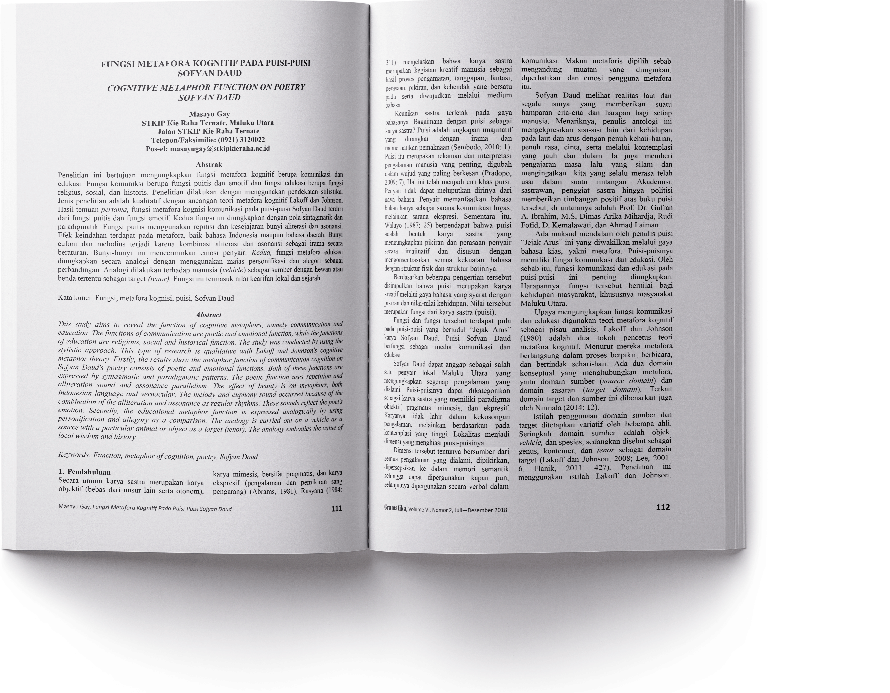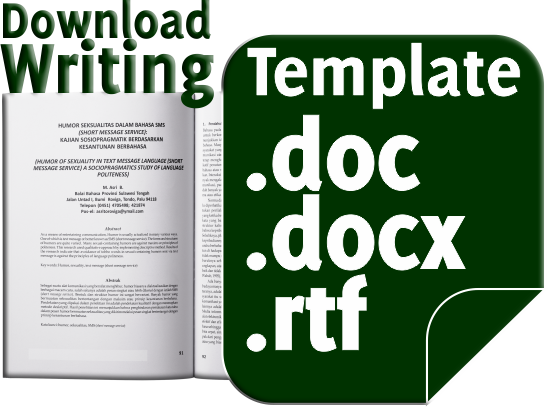Cognitive Metaphor Function on Poetry Sofyan Daud
Abstract
This study aims to reveal the function of cognitive metaphors, namely communication and education. The functions of communication are poetic and emotional function, while the functions of education are religious, social and historical function. The study was conducted by using the stylistic approach. This type of research is qualitative with Lakoff and Johnson's cognitive metaphor theory. Firstly, the results show the metaphor function of communication cognition on Sofyan Daud's poetry consists of poetic and emotional functions. Both of these functions are expressed by syntagmatic and paradigmatic patterns. The poetic function uses repetition and alliteration sound and assonance parallelism. The effect of beauty is on metaphors, both Indonesian language and vernacular. The melody and euphony sound occurred because of the combination of the alliteration and assonance as regular rhythms. These sounds reflect the poet's emotion. Secondly, the educational metaphor function is expressed analogically by using personification and allegory as a comparison. The analogy is carried out on a vehicle as a source with a particular animal or object as a target (tenor). The analogy embodies the value of local wisdom and history.
References
Abrams, M.H. 1981. A Glossary of Literary Lamps. New York: Holt Rinehart & Winston.
Aisah, S. 2010. Metafora dalam Lagu Iwan Fals yang Bertemakan Kritik Sosial, 91.
Alfarisi, A. B. T. 2015. Ekpresi Metaforis dalam Puisi Mardi Luhung. Jurnal Bebasan. Vol. 2 (2): 127.
Arifin, S. Bambang. 2015. Psikologi Sosial. Pustaka Setia: Bandung.
Arnawa, N. 2008. Wawasan Linguistik dan Pengajaran Bahasa. Denpasar: Plawa Sari.
Daud, Sofyan. 2010. Jejak Arus, 99 Puisi Pilihan. GarasiGenta: Ternate.
Flanik, W. 2011. “Bringing FPA Back Home:” Cognition, Constructivism, and Conceptual Metaphor. Foreign Policy Analysis, 7(4), 423-446.
Haase, C., & Reck, D. 2002. Understanding metaphors in everyday language.
Kovecses, Zoltan. 2006. Language, Mind, and Culture. Oxford: Oxford University Press
Lakoff, G., & Johnson, M. 2008. Metaphors we live by. University of Chicago press.
Lakoff, G., & Johnson, M. 1980. Metaphors we live by. Chicago, IL: University of.
Lee, D. A. 2001. Cognitive linguistics: An introduction. Oxford University Press.
Luxemburg, Jan Van, Mieke Bal, dan William G. Weisteijn. 1989. Tentang Sastra. Jakarta: Intermasa (Terjemahan Akhadiati Ikram).
Milles, M.B., dkk. 2013. Qualitative Data Analysis. Britania: Sage.
Mustansyir, Rizal 1988. Filsafat Bahasa: Aneka Masalah Arti dan Upaya Pemecahannya. Jakarta: Prima Karya.
Nirmala, D. 2014. Proses Kognitif dalam Ungkapan Metaforis, 13.
Nurgiyantoro, Burhan. 2017. Stalistika. Yogjakarta: Gadjah Mada University Press.
Peer, Willie van, Sonia Zyngier, & Jemelden Hakemulder. 2007. "Foregrounding: Past, Present, Future,", dalam David L. Hoover & Sharon Latting (eds). Stylistic: Prospect & Retrospect. Amsterdam-New York: Rodopi. Hlm. 1-22.
Pradopo, Rahmat. D. 2012. Pengkajian Puisi. Yogyakarta: Gadjah Mada University Press.
Pradopo, Rahmat. D. 2009. Pengkajian Puisi. Yogyakarta: Gadjah Mada University Press.
Ratna, Nyoman Kutha. 2007. Teori, Metode, dan Teknik Penelitian Sastra, Cetakan III. Yogyakarta: Pustaka Pelajar.
Richards, Ivor Amstrong. 1936. The Philosophy of Rhetoric. New York: Oxford University, Press
Rusyana, Yus. 1984. Bahasa dan Sastra dalam Gamitan Pendidikan. Bandung: CV Diponegoro.
Romero, E., & Soria, B. 2005. Cognitive Metaphor Theory Revisited. Journal of Literary Semantics, 34, 1–20. https://doi.org/10.1515/jlse.2005.34.1.1
Saifudin, A., 2012. Metafora dalam Lirik Lagu Kokoro No Tomo Karya Itsuwa Mayumi 8, 17.
Sembodo, Edy. (2010). Contekan Pintar Sastra Indonesia: untuk Anak SMP dan SMA. Bandung: PT Mizan Publika.
Schäffner, C. 2004. Metaphor and translation: some implications of a cognitive approach. Journal of pragmatics, 36(7), 1253-1269.
Siyoto, S dan Sodik. 2015. Dasar-dasar Metodologi Penelitian.Jakarta: Literasi Media Publishing.
Wahab, A. 1991. Sepotong Model Studi tentang Metafora.
Wijaya, Putu. 2007. Pengajaran Sastra. [Online]. Tersedia: http://putuwijaya.wordpress.com/2007/11/03/pengajaran-sastra. [6 Oktober 2008].
Waluyo, H.J. 1987. Teori dan Apresiasi Puisi. Jakarta : Erlangga.
Yang, X. 2015. A Cognitive Poetic Approach to the Function of Metaphor. Advances in Literary Study, 3(03), 84.

Copyright (c) 2018 Masayu Gay

This work is licensed under a Creative Commons Attribution-NonCommercial-ShareAlike 4.0 International License.


